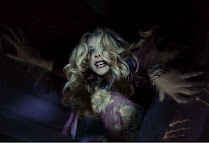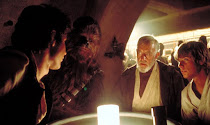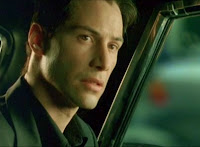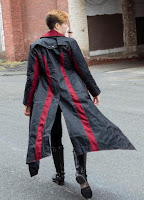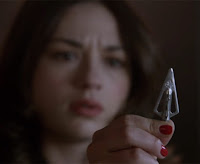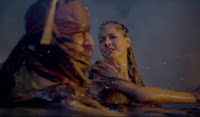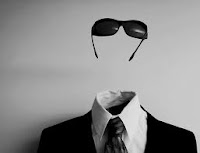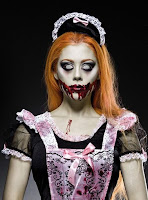I got a request from Rhyen, which is great because I still haven’t really hammered those ideas on endings or comedy quite into shape. So that’s still some stuff for the future. Or, y’know, somebody else could ask something.
Anyway…
Rhyen wanted to know about worldbuilding. Not just “our world, but with secret werewolves” but full-on, hardcore fantasy worlds, sci-fi worlds, and so on. How (and when) do you come up with histories, cultures, and all that other stuff?
Y’know what? Let’s make this post super-active rather than me blathering away. Right here, right now, let’s look at werewolf world. The other version of it where everybody knows werewolves are real.
Now, I know, we said we were going to do more hardcore settings but just go with me for a minute.
I’ve mentioned Charlie Jane Anders once or thrice before, and her little note that there’s no such thing as “a world just like ours, except…” because any noteworthy “except” is going to change everything. If there really were werewolves and everybody knew about them, so much would be different in the world. Tonsof things.
Don’t believe me? Let’s go over a few things real quick. Just off the top of my head…
Here’s an easy change. There probably wouldn’t be any silver coins. In WereWorld anything with even a scrap of silver would’ve been gathered up and turned into anti-werewolf weapons or defenses. The government would be treating silver like uranium.
Which, hey… how would warfare be different? Forget atom bombs… imagine if the Manhattan Project involved deliberately infecting a hundred or so troops with lycanthropy and then dropping them all on
But now without the
And we haven’t even talked about dating or sex in WereWorld. Hunting laws? Home security? Profiling? Legal issues—if I kill someone as a werewolf, am I legally responsible? Is it murder, which requires a degree of forethought, since the werewolf’s essentially an animal (or is it?)?
And all of these assume we just “discovered” werewolves somehow back in the early 1940s. What if it was even earlier? How would global exploration and trade have gone differently five hundred years ago if every twenty-nine days one of your crew members might kill everyone on the ship? How different would the world map look right now?
Again, this is all off the top of my head. Seriously, I’ve spent maybe ten minutes on this. But I’ve completely rewritten the world, just by being aware that things would inevitably change in this situation.
So, with that in mind…
Creating a setting, any setting, is a lot like creating a character. I want to know them backwards and forwards. It’s fantastic if I have lots and lots of factoids about them easily on hand (you may remember that back before we all took the pandemic plunge, I talked about characters and their underwear choices).
I’ve mentioned character sketches once or thricebefore, and I think worldbuilding can be approached the same way. We come up with the bare basics and then we start fleshing it out by asking questions and maybe following a few paths to their logical outcome. Like I did up above with WereWorld.
Or let’s do something even more divorced from our world. Let’s say it’s going to be a fantasy world, maybe one with some gearpunk elements. So, easy one—is there actual magic in this fantasy world? Is it kind of rare or very common? Does it need components? Are they rare or common? Do people have spell-component gardens the way we might have an herb garden?
How about the gear-tech? How precise is it? Do you need mathematically perfect brass gears or do lots of people carve wooden ones after dinner? What do they use for power? Springs? Counterweights? Two or three big guys turning a crank?
Does magic dominate the gear-tech, or vice versa? Is one notably newer than the other? Does either have detractors, vocal or secretive? Are magic and/or gear-tech novelties or parts of everyday life? Do they ever cross-pollinate, so to speak? Are they expensive or so common everyone has access to some aspect of them?
Considering all of this, now… is this mostly an agrarian world? Are more people farmers? Hunters? Are there gearpunk tractors or crossbows? Magic millstones or knives that can skin anything? And if none of this ever filters down to the common folk… how do they feel about that?
Has the magic or gear-tech made travel easier? Are people still isolated in villages or are there much bigger cities, made possible because of these advances? Do people know more about the world?
Heck, how fantasy is this world? Are there supernatural or mythological creatures? Are they common? Domesticated? Are there things we know or all-new creatures? Does the farmer have a six-legged hexox dragging his plow? Are there gods? Demons? How do they feel about humans playing with magic and gear-tech?
Or heck… is it even humans? Is this about magical halflings or gearpunk elves? I just pictured a gearpunk lizardman and that seemed pretty cool.
If you’ve answered a lot of those questions, I bet you’ve got the beginnings of a pretty solid world in your head. And probably spun off a question or three of your own. Enough so that you can start setting up your plot.
And one thing to keep in mind—just like with characters, this might change as I go along. As the story grows and progresses, I might change a lot. I might add even more. It’s an ongoing process. Halfway through my outline or my first draft, I might realize I need to address currency. And, hey, maybe this world has a really crappy exchange rate, so it matters if you’re getting paid with glowing quartz or brass gear-coins.
Again, the world is here to serve the story. You’re going to change and tweak it as you go. Maybe all the way up to your last draft. And just like with characters, you’ll keep coming up with cool little details and anecdotes.
Now… there’s three key things to remember…
First, I know I talk about editing things down a lot, but we can all breathe a small sigh of relief here. If I’ve got a story set in another world—a drastically different world—most editors are going to give me a little bit of leeway, word-count wise. They understand I’ll need a few extra pages to explain why Yakko is riding a gearpunk tractor powered by magical crystals.
This doesn’t mean I can go crazy listing details. Or that I can be really blunt with them. No pausing for two pages to randomly describe the wooden sun-and-planet gears in Yakko’s trailer. Or the long history of the mining guild that provides those magic crystals. One more time—say it with me—the world is here to serve the story. It’s okay to have a little extra flavor here and there, but I shouldn’t lose track of what my book is actually about.
Which brings me to my second point. Whenever I create a character, there’s a lot of things about them that are never going to come up in the book. Or maybe they come up, but they’re never explained. I might have tons of rich backstory and weird little details, but a lot of it just never becomes relevant.
For example, in the Threshold books, I know a ton of things about Veek. I know why she’s abrasive with most people. Why she likes wearing men’s suits and ties over women’s power suits. Heck, I made a note of when/how she lost her virginity. But the truth is, none of this has been relevant to any of the books she’s been in. It’s stuff I know, and it helps me make her feel more three dimensional on the page, but ultimately… it’s all kind of irrelevant if it doesn’t have anything to do with this book—with the plot I’m telling and the character’s arc through that plot.
Worldbuilding is the same way. No matter how fantastic or amazing the details of this world might be, they only matter if they’re going to have some kind of impact. While it may be very interesting how this society ended up with a hexadecimal/base sixteen number system, do we need to know any of that history for this story? Yes, WereWorld does have eleven continents and there’s a fascinating story behind it… which has nothing to do with this book.
And even then, I’d argue that if there’s no real reason for something to be different… maybe it shouldn’t be. I think one thing that confuses some people is they see this rich, historied world that the story’s set in and forget the world only exists to serve the story, not the other way around. If you look back at my A2Q discussion about the world Phoebe and Luna live in, I made choices based on what would be interesting for the plot and story, not what would make for an interesting world.
So I shouldn’t be coming up with (and using) new things just to come up with new, different things. I mean George RR Martin just uses leagues for distance in worldbuiding heavyweight A Song of Fire and Ice(perhaps better known by it’s
Or heck, here’s another example… any of you remember that old 70’s indie movie, Star Wars? There’s a great scene where Ben and his would-be-protégé are trying to hire a ship from some lowlife smuggler. And Ben tells him “We can pay you two thousand now plus fifteen… when we reach Alderaan.” Remember that?
So… two thousand what?
No, no, no. Don’t run to novelisations or books or articles that retconned this. Right there in the movie you watched… two thousand what?
Truth is, it doesn’t say and it doesn’t matter. For this story, the type of currency’s irrelevant. I don’t care if it’s Imperial credits or
Anyway… no, all we need to know is that two thousand is a good amount (judging off everyone’s reactions) and fifteen more makes it a very good amount. Past that, we just don’t need to know why Solo wants all these Jawa skulls Kenobi’s collected. It’s not important. The dialogue’s solid and sounds believable, which is far more important that a brief segue to explain the various types of Galactic currency and their exchange rates.
This brings me to my third and final point.
Worldbuilding is, in my opinion, a really easy trap to fall into. Because worldbuilding is fun. Seriously. That question game we played up above? We can do that for weeks with worldbuilding. Months. Maybe even years. My world is going to be so huge and so complex with so many races and creeds and economies and social structures and seriously we can spend so much time doing this instead of…
Y’know, actually writing the story.
And that’s how I generally approach worldbuilding. You may need to change this approach a bit, depending on your own story and the kid of setting you want for it, but hopefully this’ll get you a little further down that path. Or help you find your own path.
Next time… endings.
Maybe.
Until then, go write.



